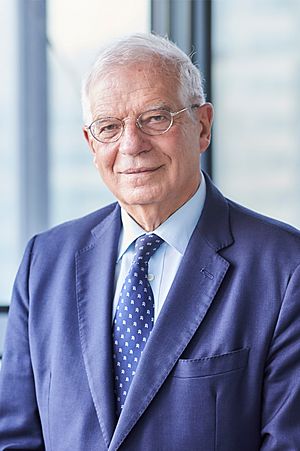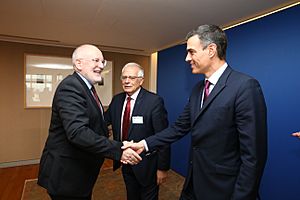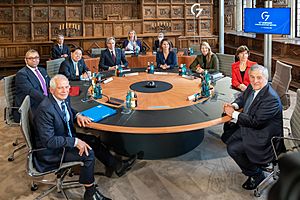Josep Borrell facts for kids
Quick facts for kids
Josep Borrell
|
|
|---|---|

Official portrait, 2020
|
|
| Vice-President of the European Commission | |
| In office 1 December 2019 – 30 November 2024 |
|
| President | Ursula von der Leyen |
| Preceded by | Federica Mogherini |
| Succeeded by | Kaja Kallas |
| High Representative of the European Union for Foreign Affairs and Security Policy | |
| In office 1 December 2019 – 30 November 2024 |
|
| Preceded by | Federica Mogherini |
| Succeeded by | Kaja Kallas |
| Minister of Foreign Affairs, European Union and Cooperation | |
| In office 7 June 2018 – 30 November 2019 |
|
| Prime Minister | Pedro Sánchez |
| Preceded by | Alfonso Dastis (Foreign Affairs and Cooperation) |
| Succeeded by | Margarita Robles (acting) |
| President of the European Parliament | |
| In office 20 July 2004 – 16 January 2007 |
|
| Preceded by | Pat Cox |
| Succeeded by | Hans-Gert Pöttering |
| Minister of Public Works and Environment | |
| In office 12 March 1991 – 6 May 1996 |
|
| Prime Minister | Felipe González |
| Preceded by | Javier Sáenz de Cosculluela |
| Succeeded by | Rafael Arias-Salgado |
| Leader of the Opposition | |
| In office 26 May 1998 – 14 May 1999 |
|
| Prime Minister | José María Aznar |
| Preceded by | Joaquín Almunia |
| Succeeded by | Joaquín Almunia |
| Member of the European Parliament for Spain |
|
| In office 13 June 2004 – 7 June 2009 |
|
| Member of the Congress of Deputies | |
| In office 15 July 1986 – 2 April 2004 |
|
| Constituency | Barcelona |
| Personal details | |
| Born |
Josep Borrell Fontelles
24 April 1947 La Pobla de Segur, Spain |
| Citizenship |
|
| Political party | Spanish Socialist Workers' (since 1975) |
| Other political affiliations |
Party of European Socialists |
| Spouses | Carolina Mayeur (div.) |
| Children | 2 |
| Education | Technical University of Madrid (BS) Complutense University (PhD) Stanford University (MS) French Institute of Petroleum (Postgraduate) |
Josep Borrell Fontelles (born 24 April 1947) is a Spanish politician. He served as the High Representative of the Union for Foreign Affairs and Security Policy and Vice-President of the European Commission from 2019 to 2024. He is a member of the Spanish Socialist Workers' Party (PSOE). Before his European roles, he was the President of the European Parliament from 2004 to 2007. He also served as Spain's Minister of Foreign Affairs, European Union and Cooperation from 2018 to 2019.
Born in a small village in Spain, Borrell first trained as an engineer and economist. He also taught mathematics at a university. He started his political career in the 1970s. He held several important jobs in the Spanish government. Later, he became a key figure in European politics.
Contents
Early Life and Education
Josep Borrell was born on 24 April 1947. His hometown was La Pobla de Segur, a village in Spain near the Pyrenees mountains. His father owned a small bakery there. His grandparents had lived in Argentina before returning to Spain.
Because his village was remote, Josep was homeschooled for part of his early education. He later moved to Barcelona and then to Madrid for university. He studied aeronautical engineering at the Technical University of Madrid. He also earned a degree and a PhD in economics from the Complutense University of Madrid. He even studied at Stanford University in the United States.
From 1972 to 1982, he taught mathematics at a university. He also worked for a company called Cepsa. He balanced his teaching and work with his growing interest in local politics.
Political Career in Spain
Starting in Local Politics
Borrell joined the Spanish Socialist Workers' Party (PSOE) in 1975. This was during Spain's move towards democracy. He became a city councilor in Majadahonda in 1979. He also worked for the local government of Madrid.
Working with Felipe González

In 1982, the PSOE party won a big election. Felipe González became Prime Minister. Borrell was given important roles in the Ministry of Economy and Finance. He worked on the national budget and public spending. He also served as Secretary of State for Finance until 1991. During this time, Spain joined the European Economic Community in 1986. He was known for fighting against tax evasion.
In 1986, he was elected to the Congress of Deputies. He represented Barcelona and remained a Member of Parliament until 2004.
In 1991, he became a minister in the Spanish government. He was the Minister of Public Works and Transport.

He helped with changes in Spain's telecommunications. After the 1993 election, he continued as a minister. He was in charge of Public Works, Transport, and Environment. He left this job in 1996 when a new party came to power.
Brief Time as Opposition Leader
In 1998, Borrell decided to run for a special election within his party. He wanted to be the PSOE's candidate for Prime Minister. He won this election, which was a surprise. This meant he became the Leader of the Opposition. However, he later resigned from this role in 1999.
Involvement in European Politics
After leaving his role as opposition leader, Borrell focused on European politics. In 1999, he became the head of a committee for the European Union in the Spanish Parliament. He also represented the Spanish Parliament in the group that wrote the European Constitution. This document later led to the Treaty of Lisbon.
In 2004, he led his party's list for the European elections. The PSOE won these elections, and Borrell became a Member of the European Parliament (MEP).
In July 2004, Borrell was elected President of the European Parliament. This was a big achievement, making him the third Spaniard to hold this important position. He served as president for the first half of the five-year term. He then chaired the Parliament's committee on development until 2009.
Stepping Back and Returning
Borrell became president of the European University Institute in 2010. He held this position until 2012. He also taught at the University of Lleida and Complutense University of Madrid.
He became a strong voice against the Catalan independence movement. He wrote a book in 2015 that challenged the economic arguments for independence. He also spoke at large rallies in Barcelona, supporting the unity of Spain and the European Union. These actions brought him back into the public eye.
Foreign Minister of Spain (2018–2019)

In June 2018, Pedro Sánchez became the new Prime Minister of Spain. Sánchez chose Borrell to be the Minister of Foreign Affairs, European Union and Cooperation. Borrell took office on 7 June. He made some changes in the ministry, appointing new officials.
He also worked on Spain's relationship with Gibraltar during Brexit talks. He focused on improving life for people in the nearby Spanish area. He signed agreements with the United Kingdom about the future relationship.
In May 2019, he ran first on the PSOE list for the European Parliament election. He won a seat but gave it up shortly after. This was because he was expected to take on a new role in the European Union. He left his position as Foreign Minister on 29 November 2019.
European Union High Representative
On 2 July 2019, Josep Borrell was nominated to be the High Representative of the Union for Foreign Affairs and Security Policy. This is a very important job in the European Union. It means he would be the EU's top diplomat, dealing with foreign policy and security. He also gained Argentine citizenship in 2019, honoring his father's heritage. He officially took office in December 2019.
Key Actions and Statements (2019-2024)

Borrell played a key role in the EU's foreign policy. He spoke out on many global issues. For example, he warned about China's efforts to gain influence during the COVID-19 pandemic. He also stated that Israel's plans to annex parts of the West Bank "could not pass unchallenged." He supported the peace agreement between Israel and the United Arab Emirates.

In 2020, he condemned the use of chemical weapons in Syria. He also called for peace between Armenia and Azerbaijan in the Nagorno-Karabakh region.

In 2021, Borrell expressed concern about China's treatment of Uyghurs. He also visited Russia, which was a challenging trip. He called for a ceasefire between Israel and Hamas in May 2021. He also discussed human rights with Saudi Arabia.


In 2022, after Russia's invasion of Ukraine, Borrell strongly condemned Russia's actions. He visited Kyiv with other EU leaders. He also welcomed a UN report on human rights abuses against the Uyghur minority in China.


In 2023, he criticized China for its support of Russia. He also condemned Azerbaijan's military actions in Nagorno-Karabakh. He strongly condemned the attack by Hamas on Israel in October 2023. He also criticized Israel's actions in Gaza, stating they broke international law.

In 2024, Borrell condemned Iran's strikes against Israel. He also called for Israel to stop its actions in Rafah, Gaza, due to the humanitarian crisis.


Other Roles and Recognition
Borrell has been a member of the board for several organizations. These include the European Institute of the Mediterranean and Reporters Without Borders. He has received many honors for his public service. These include the Grand Cross of the Order of Charles III and the Legion of Honour from France. He also received a medal for his work on the European Constitution.
Personal Life
Josep Borrell has two sons from his first marriage. In 2018, he married Cristina Narbona. She is also a Spanish politician and a former Minister of Environment.
Borrell speaks several languages, including Spanish, Catalan, Italian, French, and English. He enjoys taking part in a traditional festival in his hometown. In this festival, people float down the Noguera Pallaresa river like old-time log drivers.
Images for kids
-
Borrell speaks to the European Parliament in 2022.
See also
 In Spanish: Josep Borrell para niños
In Spanish: Josep Borrell para niños







